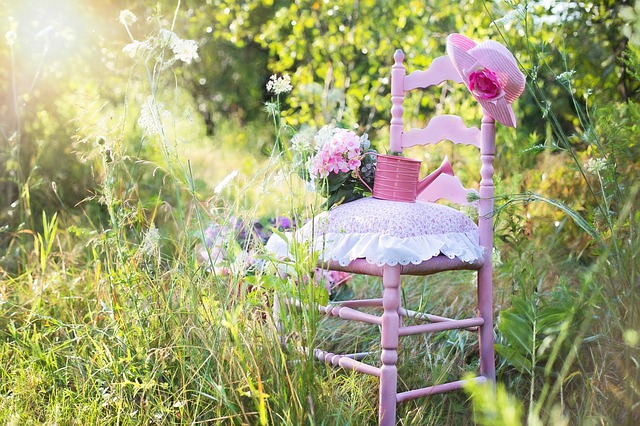
Application of correct organic horticulture tips and products will shine through in the quality of your garden. It signifies that you have care for your plants and you desire good health for them. This is extremely laudable. Improvement to any skill can always be achieved, and this skill set is no different. Read this article to become a better gardener.
Clay soil can be very hard to work with, and you will often find that it sticks to the shovel. To ease the digging, apply some car wax or floor wax to the head of the shovel and buff. Not only will the clay slide off the surface, but it will keep the end from rusting.
The handles of your tools can double as clever rulers. Large handled tools such as shovels, rakes, and hoes can be used as measuring sticks. Just run some measuring tape right on the floor next to the handles. Mark the measurements with a permanent marker. You will never find yourself looking for a ruler thanks to this simple tip.
Be sure to weed your garden. Weeds can destroy a once promising garden and take away all its potential. White vinegar has been known to kill weeds quickly. White vinegar can not only kill the weeds, it’s also a non-toxic spray that won’t harm pets or people. Try spraying some white vinegar in water when you are pulling weeds from your garden.
Before you start planting your garden, plan it! This way, you will remember the places you planted your seeds when they start sprouting. You can also avoid losing the smaller plants, or in larger gardens, the small plant groups.
When deciding on which plants to include in your landscaping projects, consider evergreens which produce colorful berries. These evergreens will color your lawn, even when other flowers are not blooming. Some evergreens that will add life to your yard in the wintertime are the American Cranberrybush, Common Snowberry, Winterberry, and American holly.
Controlling pests can be quite challenging when trying to grow a healthy, hardy vegetable garden. One major benefit of growing your own produce is knowing that they haven’t been treated with pesticides and other harsh chemicals. The key to keeping garden pests at bay is to be relentless. If you find any unwanted pests, try removing them by hand.
Use cologne or other items with a distinct scent to keep your canine out of the landscaping. Your dog will find more interesting scents to explore elsewhere and leave your garden alone.
In the hottest time of the day, most vegetables are less firm; even the act of harvesting the veggies may cause bruising. When you remove the produce from the plant, use shears or a knife to cut them from the vine without twisting, as this can damage the plant.
Get your children interested in helping with your organic garden. A garden can be a great learning experience for your children, and it gives you a chance to bond while producing healthy food.
Make sure you protect your knees well while you are horticulture. It’s difficult for most people to bend while standing, especially at the waist. Kneeling is much better for your back, and it will help you to tend to your plants with greater ease. You can use knee pads to kneel without the pain.
It can be extremely fast and easy to plant perennials into your garden. All you need to do is use a garden spade to slice under the turf, flip it over, then spread wood chips over the area about three to four inches deep. Let the area sit for a fortnight, then turn the earth and set up your new perennial bed.
Regular maintenance prevents your gardening tasks from becoming overwhelming and unappealing. Even if you can’t tend to your garden daily, you can do little things to help so that there is not a huge amount of work to be done when you are ready to get back to it. For example, pull a few weeds if you’re outside and waiting for your dog to finish his business.
Adding a lot of mulch to your garden is a great tip to implement in order to keep your garden healthy. Mulch can help protect your soil. It helps keep your soil cooler on warmer days, which protects the roots underneath. It also keeps soil moist longer by preventing water evaporation. Mulch is also excellent for keeping weeds at bay.
Avoid over-watering your plants. Excess water may hinder the plant’s roots from getting nutrition from the soil. Before watering your plants outdoors, check to see if there is rain in the forecast. If rain is in the forecast, it is best not to water that day.
Build a garden full of diversity. The more types of plants you have, the more kinds of wildlife you’ll have. Make your garden naturally inviting by planting many different kinds of plants. Not only will wildlife enjoy the space you have created, but you will have a pleasant spot to relax, and feel satisfied that you are helping the environment.
Now you know more about organic horticulture. This is great news! As with most things, organic horticulture requires that you never stop learning to improve your craft. Take the tips from above to boost your knowledge arsenal about organic horticulture. You have likely, however, learned at least one thing that will be well put to use in your garden.